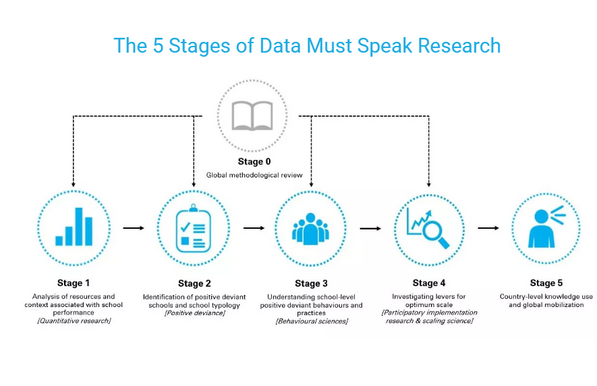For #EducationDay, I'm glad to share our new
UNICEF Innocenti
report on the performance factors of schools in #Togo done in collaboration with the Togolese Ministry of Education. https://unicef-irc.org/publications/pdf/DMS_Togo_FR.pdf
A about the results:
The report includes an in-depth analysis of Togolese administrative education data: 8 years of EMIS data (2013-2021) of all primary and secondary schools in Togo.
We were able to link school info over time to compute promotion rates and linked exam results to schools.
That made possible to compute cool stats such as the chance of promotion depending on parental occupation.
Children of civil servants (grey) are much more likely to be promoted than the ones of farmers (green).
Boys are more likely to be promoted than girls from the end of primary school and students in urban areas are much more likely to be promoted than the ones in rural areas.
Exam results and promotion rates are our 2 main performance indicators.
-> Promotion: depends on a std test but data errors and also depends on student's circumstances.
-> Exam: should capture learning better but only a subset of students sit exams (~60% reach last prim grade).
We go further than descriptive stats and fit some models explaining students performance.
For promotion, our unit of analysis is grade/sex. For ex., the chance of being promoted at the end of grade X for girls linked to their teacher char., books, class size, school char. etc.
We included school fixed effect. We're aware of the difficulty of the causal interpretation of our results but sensitivity tests (Oster bounds) make us believe endogeneity biases are limited.
For ex., here is the relationship btw class size and promotion (left)/exams (right).
So, class size seems to matter, especially at secondary level.
We also found a relative large + effect of book availability (esp. at secondary level).
Neg. effects of multigrade, teacher being the director or lack of seats.
No effects of teacher qualification.
There are a lot of interesting gender results. Female teachers are associated with better results for girls (but neg. for boys). At secondary level, more female teachers could close the gap in exam success.
Also, female directors are good for female students at primary level.
Distance from home to school matters mostly for girls (it seems to be linked with more dropouts). Similarly, the presence of latrines is positive only for girls at primary level (positive for boys and girls at secondary level).
We also have a short analysis of the impacts of the Covid school closure. Fortunately, we don't find a spike in drop out the following academic year. Promotion rates actually improved because the gvt forced the school to reduce repetitions.
But we find a small drop in the number of newly enrolled in 1st grade. We don't know why but it's a trend to monitor in the future to make sure those kids will eventually enroll at school.
There's much more in the report and we also have 3 short policy briefs on gender, teachers and school inputs to summarize our results for policy makers.
The #DataMustSpeak research continues in Togo. Last year, we collected data on 50 positive deviant and 50 control schools. Positive deviant schools are schools that are very successful given their environment and resources.
We collected quantitative and qualitative data on teachers, directors, parents and classroom observations with the hope to understand what makes those schools better.
We're currently analyzing the data and should publish the report later this year.
Data Must Speak operates in 14 countries. You can read more about our research here: https://www.unicef-irc.org/research/data-must-speak/


